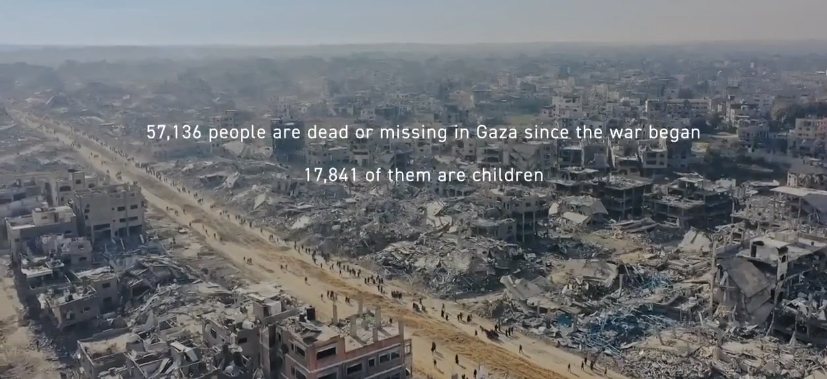The BBC continues to stoke controversy after pulling its documentary Gaza: How to Survive a War Zone from its iPlayer streaming service following pressure from pro-Israel activists. The film, which aired briefly on BBC Two, provides a harrowing glimpse into the lives of Palestinian children living under Israeli bombardment, narrated by 13-year-old Abdullah Al-Yazji.
The BBC justified its decision by citing the fact that Al-Yazji’s father was a former Palestinian government deputy minister, a detail they claimed to have learned only after the broadcast. This reasoning has been widely condemned as a pretext for politically motivated censorship, with critics pointing out that the BBC has never applied similar scrutiny to Israeli figures interviewed in its reporting.
Backlash Over BBC’s Removal of the Documentary
An open letter signed by 700 journalists, media professionals, and human rights advocates, including sports broadcaster Gary Lineker and actor Miriam Margolyes, denounced the BBC’s decision as “political interference in journalism.” The move has intensified allegations that the broadcaster operates under external influence, particularly from pro-Israel lobbying groups.
The controversy was sparked by a blog post from David Collier, a staunch pro-Israel commentator known for his ties to Israeli political circles. Collier accused the documentary of being Hamas propaganda, referring to Al-Yazji as part of “Hamas royalty.” His claims were quickly amplified by The Times of London, leading to a wave of pressure on the BBC to withdraw the film.
Despite these allegations, the documentary itself adheres to the BBC’s standard editorial policies and includes official Israeli military statements in response to the violence depicted. One of the central figures in the film, 11-year-old Zakariya, a young volunteer at Al-Ahli Hospital, openly states that he does not support Hamas and even holds them responsible for aspects of the war. Such moments directly contradict claims that the documentary is biased, yet the outcry from pro-Israel activists led to its removal nonetheless.
Censorship, Bias, and Political Double Standards
The BBC’s decision has fueled broader accusations of bias in its reporting on Israel and Palestine. Recently, protests against perceived pro-Israel coverage outside the BBC’s headquarters were banned by the UK government, while pro-Israel demonstrations—such as one organized by the Campaign Against Antisemitism in response to the documentary—were allowed to proceed unimpeded.
Critics argue that the BBC’s censorship of Gaza: How to Survive a War Zone reflects a wider pattern of suppressing Palestinian voices. Activists have been sharing unauthorized copies of the film on social media in defiance of its removal, ensuring that its message continues to reach the public.
The “Israel’s Right to Defend Itself” Narrative and International Law
Much of the political discourse surrounding Israel’s actions in Gaza relies on the oft-repeated claim that “Israel has the right to defend itself.” However, under international law, this argument is highly contested. As an occupying power, Israel does not have the legal right to “defend itself” against resistance from the people it occupies. According to the Fourth Geneva Convention and multiple UN resolutions, Palestinians have the right to resist military occupation, including through armed struggle.
Despite this legal reality, UK politicians continue to invoke Israel’s “self-defense” as justification for its military actions.
- Kemi Badenoch (Leader of the Conservative Party) has echoed this narrative while calling for an independent inquiry into the BBC’s documentary. However, her stance ignores the legal framework that denies an occupying power the right to claim self-defense against those resisting its control.
- Luke Akehurst (Labour MP for North Durham), a former director of We Believe in Israel, has also supported Israel’s military actions under the pretext of self-defense, while dismissing concerns over Palestinian resistance and international legal principles.
- Lisa Nandy (Culture Secretary) has scheduled an urgent meeting with BBC executives over the controversy but has previously advocated for increased humanitarian aid to Gaza without addressing the root cause of the conflict—Israeli occupation.
Religious Symbolism and Manufactured Controversy
Another point of contention surrounding the documentary is its translation of the Arabic word yahood (Jews) as “Israelis” in subtitles. Some critics claim this translation sanitizes antisemitism, while others argue it accurately reflects how Palestinian civilians perceive the forces attacking them.
Experts highlight that Israel officially identifies itself as the Jewish state, incorporating Jewish symbols into military insignia and state rhetoric. “Palestinians refer to Israeli soldiers as yahood because that is how Israel identifies itself—as a state representing the Jewish people,” explained journalist Ali Abunimah. “This is not an attack on Judaism, but a response to colonial violence.”
This comes amid increasing reports of Israeli forces using religious imagery as a tool of domination in Gaza. The military has carved giant Stars of David into the landscape, defaced Palestinian property with religious markings, and reportedly branded detainees with Jewish symbols. Meanwhile, Israeli airstrikes continue to target mosques and churches, acts that are rarely covered in Western media.
A Pattern of Silencing Palestinian Voices
The removal of Gaza: How to Survive a War Zone is just the latest in a long-standing trend of silencing Palestinian perspectives in Western media. As reports of war crimes in Gaza mount and global outrage against Israel’s actions grows, media suppression is becoming an increasingly crucial tool in shaping public perception.
Whether the BBC reinstates the documentary remains to be seen, but the backlash underscores the wider struggle over who controls the narrative on Gaza—and the lengths to which powerful actors will go to silence dissent.



